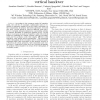Free Online Productivity Tools
i2Speak
i2Symbol
i2OCR
iTex2Img
iWeb2Print
iWeb2Shot
i2Type
iPdf2Split
iPdf2Merge
i2Bopomofo
i2Arabic
i2Style
i2Image
i2PDF
iLatex2Rtf
Sci2ools
104
click to vote
ICC
2008
IEEE
2008
IEEE
Cognitive Radio with Secondary Packet-By-Packet Vertical Handover
– According to the commons model of cognitive radio, the activity of secondary (unlicensed) nodes is required to guarantee quality-of-service (QoS) constraints on the transmission of primary (licensed) terminals. Towards this goal, vertical handover between different radio interfaces is currently being investigated as a promising solution to enhance flexibility in unlicensed channel access. In this paper, we propose an analysis of cognitive radio with vertical handover capability in a simple scenario with one secondary node and two primary nodes that employ different radio interfaces with packet-based transmission. The maximum stable throughput of the secondary node is evaluated under maximum-delay QoS constraints on the primary activity as a function of system geometry, QoS constraints and sensing errors. Numerical results show the relevant advantages of optimal vertical handover in terms of the throughput of secondary nodes.
| Added | 30 May 2010 |
| Updated | 30 May 2010 |
| Type | Conference |
| Year | 2008 |
| Where | ICC |
| Authors | Jonathan Gambini, Osvaldo Simeone, Umberto Spagnolini, Yeheskel Bar-Ness, Yungsoo Kim |
Comments (0)

